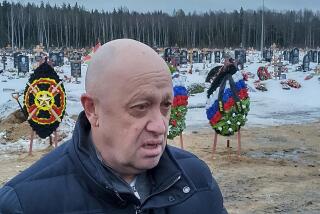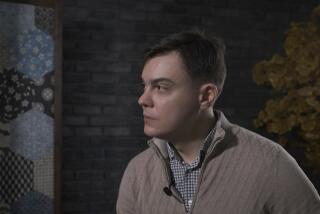Rifts in Soviet Politburo Seen by U.S. Analysts
- Share via
WASHINGTON — Signs of serious leadership disputes within the ruling Politburo emerged during the recent Soviet Communist Party Congress in Moscow, according to U.S. government and non-government analysts, and the tension could be limiting the pace and scope of Soviet leader Mikhail S. Gorbachev’s plans for economic reform and foreign policy.
The Kremlinologists have found strong indications that Gorbachev wants to reduce Soviet involvement in the Third World and to focus on relations with the United States. This suggests he genuinely seeks improved relations and new arms control agreements.
Gorbachev’s Opponents
But several U.S. officials speculated that Gorbachev is being hobbled by the military in league with his political opponents, who appear to be led by the Politburo’s No. 2 man, Yegor K. Ligachev. A native of Siberia, Ligachev is in charge of party personnel and ideology.
“I think Gorbachev will try to get rid of this guy,” one veteran government expert on the Kremlin predicted, “and sooner rather than later.”
Harry Gellman of the Rand Corp., a think-tank in Santa Monica, said, “The evidence of intense political infighting is greater than we’ve seen since Khrushchev’s days.” Nikita S. Khrushchev also attempted thorough political and economic reforms between 1956 and his ouster by Leonid I. Brezhnev in 1964.
Marc Zlotnik of the CIA told a seminar Friday that “Gorbachev still wants to make major changes (in Soviet economic and foreign policy), but he is encountering substantial resistance. He underestimated the difficulties he faced. . . . He is not retreating, but he is taking a much longer view.”
At the party congress last month, leadership differences surfaced most directly over the Soviet elite’s special privileges, such as stores with imported goods, separate medical clinics and choice vacation spots. But beneath the surface, divisions extended to Gorbachev’s proposals for economic reform and faster advancement of younger people into leadership roles.
Gorbachev’s political opponents, who are considered neo-conservatives and generally anti-Western, may be making common cause with the military, which again was blocked during the congress from winning full membership on the Politburo for the defense minister.
Some U.S. Kremlinologists believe the Soviet military had veto power over arms control proposals until Gorbachev rose to power. If so, it no longer does. But the military probably still has sufficient influence in the bureaucracy to block arms control progress, several experts said, and thus may be to blame for the current impasse in those talks.
The leadership split came to light most dramatically when Ligachev, who at 65 is 10 years older than Gorbachev, publicly rebuked the party newspaper, Pravda, during the Congress for an article that contained unprecedented criticism of special privileges enjoyed by Soviet leaders. “A slimy party administrative stratum” has grown between the working class and the leadership, the paper had also complained.
Supported Pravda Article
Gorbachev, a supporter of Pravda’s editor, probably endorsed the article because it fit his anti-corruption theme. Gorbachev is also the sponsor of Moscow’s new party boss, Boris N. Yeltsin, who repeated the attack on special privileges during the congress.
But Gorbachev himself paid little attention to the corruption issue at the Congress, according to Timothy Colton of the University of Toronto. Another Kremlinologist who asked not to be named put it more bluntly: “Gorbachev took a powder when the heat got too great.”
Gorbachev’s statements, moreover, contain their own internal contradictions. His strong emphasis on “social justice,” a euphemism for reducing the privileges for the party elite, clashed with his call for greater rewards for those who work hardest and accomplish most.
“He’s pretty puritanical himself, but it’s clear that Raisa doesn’t shop at GUM for those dresses,” quipped another analyst about Gorbachev’s wife’s taste in fine clothes. GUM is a massive Moscow department store that features typical, pedestrian Soviet goods.
In the four weeks since the 27th party congress, a gathering that occurs about every five years, analysts at Rand, Georgetown University’s Center for Strategic and International Studies, and Johns Hopkins University’s School for Advanced International Studies have been poring over the tons of speeches, press reports and other documentation from the weeklong meeting.
Startled by Dobrynin’s Recall
They were most startled by the recall of Anatoly F. Dobrynin, Soviet ambassador to the United States for 23 years, to a highly influential job within the party’s Moscow bureaucracy, probably as head of the Central Committee’s International Department.
“It’s as if Frank Church were made president of the Heritage Foundation,” said one Kremlinologist with admitted exaggeration. The late Sen. Church (D-Idaho) personified the liberal line, while the Heritage Foundation is an avowedly conservative group.
U.S. government analysts strongly disagreed that Dobrynin is soft-line or pro-American. But Dobrynin will bring to the Kremlin first-hand knowledge of U.S. political and economic issues, including arms control, and of leading American personalities and public attitudes, which could shift that bureaucracy’s policy-making focus away from the developing nations and to U.S.-Soviet relations, they said.
Soviet activities in the Third World, from Afghanistan to Angola and Nicaragua, have had a damaging impact on U.S.-Soviet relations. Reduced Soviet involvement in those regions would be a positive step in reducing superpower tensions.
Further evidence of a possible shift away from the Third World was the absence in Gorbachev’s speech of traditional Kremlin support for “wars of national liberation” and “national liberation struggles.”
Liberation Movements
“Not a single keynote address since 1956 failed to emphasize Soviet support for national liberation in the Third World--until this one,” according to one analyst.
Some analysts also saw signs of ambiguity in Soviet foreign policy in speeches at the Congress and tied them to the stalemated arms control talks at Geneva, where Soviet negotiators have not followed through on Gorbachev’s public commitments.
For example, Gorbachev pushed the “peace theme” but complained plaintively that Washington refuses to go along. He further complained that Moscow has no alternative but to continue pushing for peace. Some analysts dismiss this as pure propaganda, but others believe it reflects broader foreign policy disarray in the Kremlin, particularly in the area of arms control.
To them, Gorbachev now faces a dilemma regarding the next summit. He told the congress that the meeting, expected in Washington this year, would have no point if the prospect was for only “empty talks.” Now he must make further concessions in arms control, these analysts believe, or refuse to come to the next summit if no progress occurs in the negotiations.
Even if he comes, however, there are questions in the minds of very senior Administration officials about how well he can deliver on his commitments.
Summit Promise
They point out that Gorbachev and Reagan, in their communique from the November summit, promised to accelerate the arms talks and called for “early progress, in particular in areas where there is common ground, including the principle of 50% reductions in nuclear arms.”
But according to a senior U.S. arms negotiator, “the Soviets flatly refused to negotiate it (the 50% reduction) in Geneva. They just would not talk about it.”
The chief U.S. negotiator at the strategic arms talks, John Tower, at one point told his Soviet counterpart that he saw “lots of areas of convergence” between the U.S. and Soviet positions, the official added. But the Soviet negotiator replied that he saw “no areas of convergence” despite the summit communique.
Tower has resigned from the U.S. team, partly in frustration over the Soviet attitude, which several U.S. experts blamed on the Soviet military.
More to Read
Sign up for Essential California
The most important California stories and recommendations in your inbox every morning.
You may occasionally receive promotional content from the Los Angeles Times.













